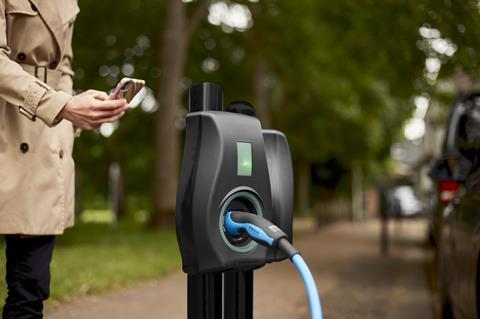- Vauxhall has partnered with online car marketplace, carwow, for Electric Streets of Britain programme
- 15% of car enquiries are for electric vehicles, according to data released by carwow in association with Vauxhall
- Vauxhall’s Electric Streets of Britain programme aims to accelerate the provision of on-street charging
- 72% of UK councils have no published strategy for residential on-street charging, according to Vauxhall
- 80% of EV charging apparently takes place at home, so residents without off-street parking will be forced to rely on public charging
- ElectricStreets.co.uk was launched by Vauxhall to support the 40% of UK households without a driveway

Vauxhall has partnered with online car marketplace, carwow, to accelerate its Electric Streets of Britain programme, launched in summer 2023, to help the 40% of households without off-street parking make the switch to electric.
Through access to carwow’s extensive database, Vauxhall says it can work with councils to pinpoint where interest in electric vehicles (EVs) is strongest across the country and where requirement lies for on-street charge-point installation to be accelerated.
Carwow claims that 15% of car enquiries so far this year have been for EVs, based on analysis of its database of over 320,000 car enquiries in 2023, and highlights the disparity between EV interest and charge-point installation and the scale of growth required in the UK’s charging network to keep pace with EV sales.
Vauxhall’s Electric Streets of Britain aims to address the lack of on-street charging provision in the UK, which it says is a key barrier to entry for motorists. Research revealed that more than 70% of UK councils currently do not have a published strategy in place for residential on-street charging for EVs, and that 69% of local authorities have yet to install any on-street chargers.
It claims that the majority of EV charging (80%) is completed at home as it represents the most cost-effective and convenient method for motorists – yet 40% of UK households do not have access to off-street parking, a figure that rises above 60% in urban areas.
James Taylor, managing director, Vauxhall, said: “We know that over 70% of UK councils have no published strategy for residential on-street charging and want to help local authorities install charging infrastructure where it’s needed, so car buyers are not put off by a lack of available charging as the number of EVs on the road grows.
“From 2035, Government mandate dictates that all new cars sold must be electric, and this data shows there is work to do to support consumers making the switch. Electric Streets is just part of a package of measures Vauxhall is introducing to improve accessibility, including everything from investing in EV manufacturing in the UK, at our Ellesmere Port facility, to introducing long term PCP deals for customers.”
Despite delaying the ban on the sale of new petrol and diesel vehicles from 2030 to 2035, the Government’s zero emissions vehicle (ZEV) mandate still comes into force next year. It requires a minimum 22% of cars, and 10% of vans, sold by manufacturers to be electric.
Carwow’s share of enquiry by fuel type data demonstrates that nationwide interest in EVs needs to increase by 7% if car makers are to hit the UK’s mandated 22% EV market share next year.
Through Electric Streets of Britain, Vauxhall has established an ‘Enablement Fund’ to help improve Local Authority understanding of residential on-street charging needs, working with leading charging operators char.gy, Connected Kerb and SureCharge.
The Electric Streets of Britain programme also includes a new national database on its website for the public to register their charging needs. Carwow has joined the initiative to help drive EV adoption as the UK transitions to electric.
Sepi Arani, commercial director at carwow, said: “It’s promising to see that people across all parts of the country are looking to make the switch to electric as we move from the innovators and the early adopters already driving EVs to the early majority. Our data clearly demonstrates strong and consistent interest in EVs, despite some motorists living in areas with little private off-street parking.
“What’s key now is that the industry comes together and works with local authorities to not only install more charge points, but, critically, ensure installation where they are needed most. It’s not simply about boasting about a total number, but getting the location, accessibility and the type of charger right is the recipe to ensure a significant real world impact for consumers.
“To see a brand taking the charge on this as a real champion of the consumer speaks volumes for Vauxhall’s continued commitment to support UK motorists. This will avoid any EV infrastructure bottlenecks which could impact uptake over the coming years. Boosting the spread of charging points to smooth the transition to electric will also help the UK to meet its net zero targets.”
Vauxhall will offer a fully electric version of every car and van model in its line-up from 2024. Currently it claims to be the best-selling electric van manufacturer in the country, and its Ellesmere Port plant recently reopened to become Stellantis’ first manufacturing site dedicated to electric models.
For more information, visit http://electricstreets.co.uk/
































